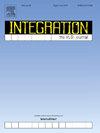基于机器学习的差分毫米波lna设计自动化框架
IF 2.5
3区 工程技术
Q3 COMPUTER SCIENCE, HARDWARE & ARCHITECTURE
引用次数: 0
摘要
在这项工作中,采用新颖的全设计自动化框架提出了单级差分窄带毫米波LNA的设计方法。采用22 nm FDSOI CMOS工艺设计了差分LNA测试用例车,并根据该工艺开发了ML框架。该框架基于噪声系数、增益和阻抗匹配工作频率的电路优化回路。该框架能够生成输入/输出匹配效率≥99%的差分LNA设计,在32-91 GHz的频率范围内,低噪声(lt;4.4 dB),高增益(gt;14 dB),高线性度(gt;−19 dBm)。本文章由计算机程序翻译,如有差异,请以英文原文为准。
A machine learning-based design automation framework for differential mmWave LNAs
In this work, a design methodology of a single-stage differential narrow-band mmWave LNA is presented using a novel full-design automation framework. A differential LNA test case vehicle was designed using a 22 nm FDSOI CMOS process and the ML framework was developed according to this specific process. The proposed framework is based on circuit optimization loops regarding noise figure, gain and impedance matching operating frequency. The proposed framework is capable of generating differential LNA designs with input/output matching efficiency, low noise dB, high gain dB, high linearity dBm, for frequencies of 32-91 GHz.
求助全文
通过发布文献求助,成功后即可免费获取论文全文。
去求助
来源期刊

Integration-The Vlsi Journal
工程技术-工程:电子与电气
CiteScore
3.80
自引率
5.30%
发文量
107
审稿时长
6 months
期刊介绍:
Integration''s aim is to cover every aspect of the VLSI area, with an emphasis on cross-fertilization between various fields of science, and the design, verification, test and applications of integrated circuits and systems, as well as closely related topics in process and device technologies. Individual issues will feature peer-reviewed tutorials and articles as well as reviews of recent publications. The intended coverage of the journal can be assessed by examining the following (non-exclusive) list of topics:
Specification methods and languages; Analog/Digital Integrated Circuits and Systems; VLSI architectures; Algorithms, methods and tools for modeling, simulation, synthesis and verification of integrated circuits and systems of any complexity; Embedded systems; High-level synthesis for VLSI systems; Logic synthesis and finite automata; Testing, design-for-test and test generation algorithms; Physical design; Formal verification; Algorithms implemented in VLSI systems; Systems engineering; Heterogeneous systems.
 求助内容:
求助内容: 应助结果提醒方式:
应助结果提醒方式:


